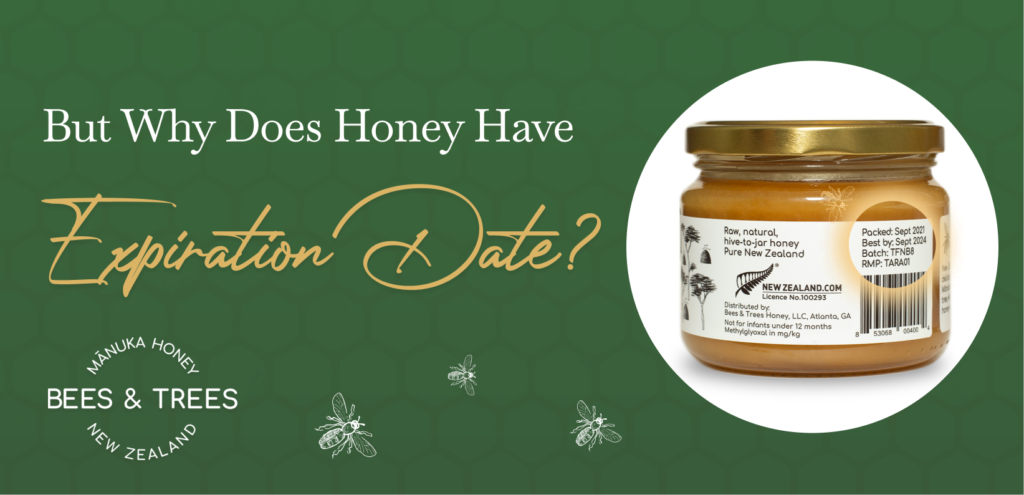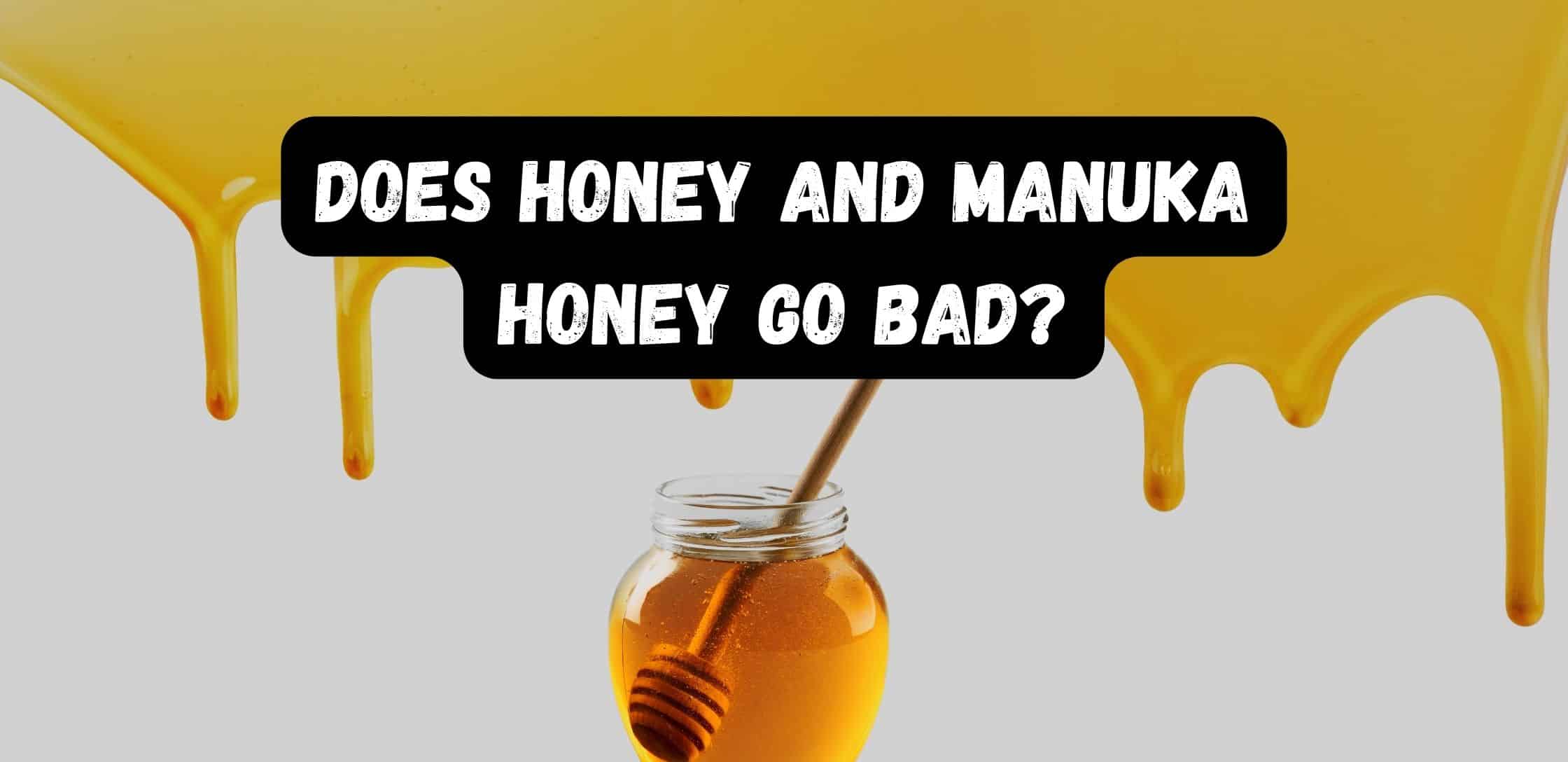
Have you ever wondered how long your jar of manuka honey will stay fresh and flavorful? In this article, we will explore the shelf life of manuka honey and provide you with essential tips on storage and longevity. So, put on your beekeeper hat and get ready to learn all about preserving the deliciousness of this unique and valuable honey variety.
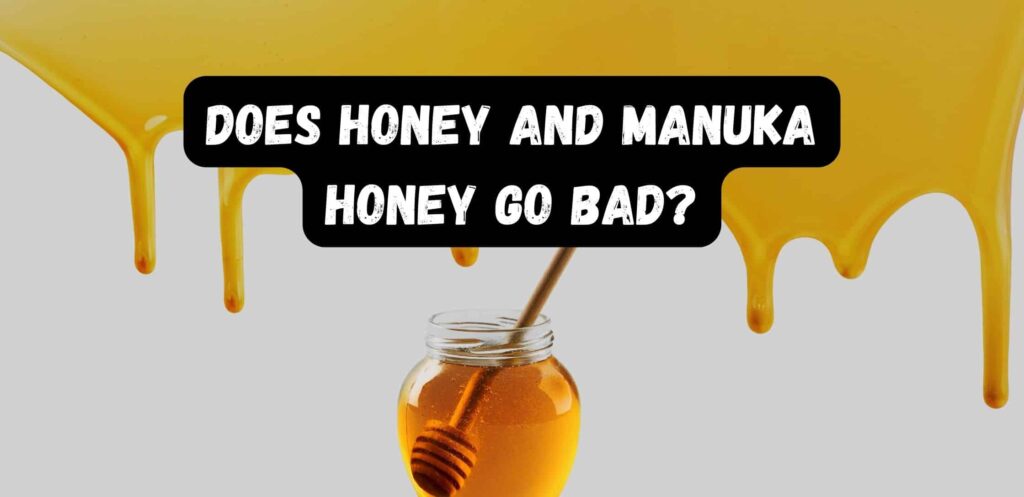
Factors that affect the shelf life of manuka honey
Moisture content
The moisture content in manuka honey plays a crucial role in determining its shelf life. Honey with a higher moisture content is more prone to fermentation and spoilage. Therefore, it is important to ensure that the moisture content of manuka honey is within the recommended range, which is typically below 20%.
Temperature
Temperature is another significant factor that can impact the shelf life of manuka honey. It is recommended to store manuka honey at a moderate temperature, preferably between 50°F and 70°F (10°C and 20°C). Extreme temperatures, such as excessive heat or cold, can degrade the quality of the honey and reduce its shelf life.
Exposure to light
Exposure to light, especially sunlight, can have detrimental effects on the shelf life of manuka honey. UV rays present in sunlight can accelerate the process of honey degradation, leading to color changes and a decrease in nutritional value. It is advisable to store manuka honey in opaque containers or in a dark cupboard to minimize light exposure.
Quality of packaging
The packaging of manuka honey can greatly influence its shelf life. Airtight and sealable containers are essential for preserving the freshness and quality of the honey. It is important to ensure that the packaging is of high quality and adequately protects the honey from external factors such as air and moisture.
Storage conditions
The overall storage conditions of manuka honey significantly impact its shelf life. It is important to store the honey in a cool, dry, and dark environment. Humidity can trigger fermentation, while excessive heat can lead to crystallization and degradation of the honey. Proper storage conditions help maintain the integrity and extend the shelf life of manuka honey.
Indicators of spoilt manuka honey
Appearance
One of the key indicators of spoilt manuka honey is a change in its appearance. Fresh manuka honey typically has a smooth texture and a golden or amber color. If the honey appears cloudy, has crystallized or has an unusual color, it may be an indication of spoilage.
Texture
Spoiled manuka honey may have an altered texture. Instead of being smooth and viscous, it can become gritty or grainy. Crystallization is a natural process in honey, but excessive crystallization or a sandy texture can indicate that the honey is no longer in its prime condition.
Smell
Another way to determine if manuka honey is spoilt is through its smell. Fresh manuka honey has a distinct floral aroma with hints of sweetness. If the honey smells fermented, sour, or has an off-putting odor, it may have gone bad and should not be consumed.
Taste
Taste is perhaps the most reliable indicator of spoilt manuka honey. Good quality manuka honey has a rich, sweet taste with unique floral notes. If the honey tastes sour, fermented, or has an unpleasant aftertaste, it is best to discard it as it may pose health risks.
Storage recommendations for manuka honey
Sealing the container properly
To ensure the longevity of manuka honey, it is crucial to seal the container properly. This prevents moisture and air from entering and potentially spoiling the honey. Make sure the lid or cap is tight and secure to maintain the integrity of the honey.
Storing in a cool and dry place
Manuka honey should be stored in a cool and dry place to maintain its freshness and quality. Cooler temperatures help slow down the natural process of honey crystallization, while a dry environment prevents moisture absorption and fermentation.
Keeping away from direct sunlight
Direct sunlight can accelerate the degradation process of manuka honey. UV rays present in sunlight can lead to color changes and nutrient degradation. To extend the shelf life of manuka honey, store it in a dark cupboard or pantry away from any direct sources of light.
Avoiding contamination
To prevent contamination and preserve the quality of manuka honey, it is important to avoid introducing foreign substances to the honey. Always use clean utensils or a fresh, dry spoon to scoop out honey from the container. Keep the honey away from substances with strong odors or flavors that can potentially affect the taste.
Refrigeration and freezing
While manuka honey generally does not require refrigeration, storing it in the refrigerator can further extend its shelf life. Refrigeration helps slow down the natural enzymatic activity in honey, which can contribute to its preservation. Freezing manuka honey is also an option for long-term storage, but it is advisable to transfer the honey to airtight containers to prevent moisture absorption and potential freezer burn.
How to determine if manuka honey is still good to consume
Check expiration date
Checking the expiration date is the first step to determine if manuka honey is still good to consume. Manufacturers include an expiration date on the packaging to guide consumers on the optimal consumption timeframe. If the honey is past its expiration date, it is generally recommended to discard it.
Perform visual inspection
A visual inspection can provide valuable insights into the condition of manuka honey. Check for any signs of spoilage, such as cloudiness, crystallization, or unusual color changes. Fresh, high-quality manuka honey should have a clear, golden appearance.
Assess aroma
The aroma of manuka honey can indicate its freshness and quality. Take a moment to smell the honey and assess if it has a sweet, floral scent. If the honey smells off, fermented, or has an unpleasant odor, it is likely not suitable for consumption.
Conduct a taste test
Taste testing is perhaps the most reliable method to determine if manuka honey is still good to consume. Take a small amount of honey and let it coat your tongue. Fresh manuka honey should have a rich, sweet taste with distinct floral notes. If the honey tastes sour, fermented, or has an unpleasant aftertaste, it is best to refrain from consuming it.
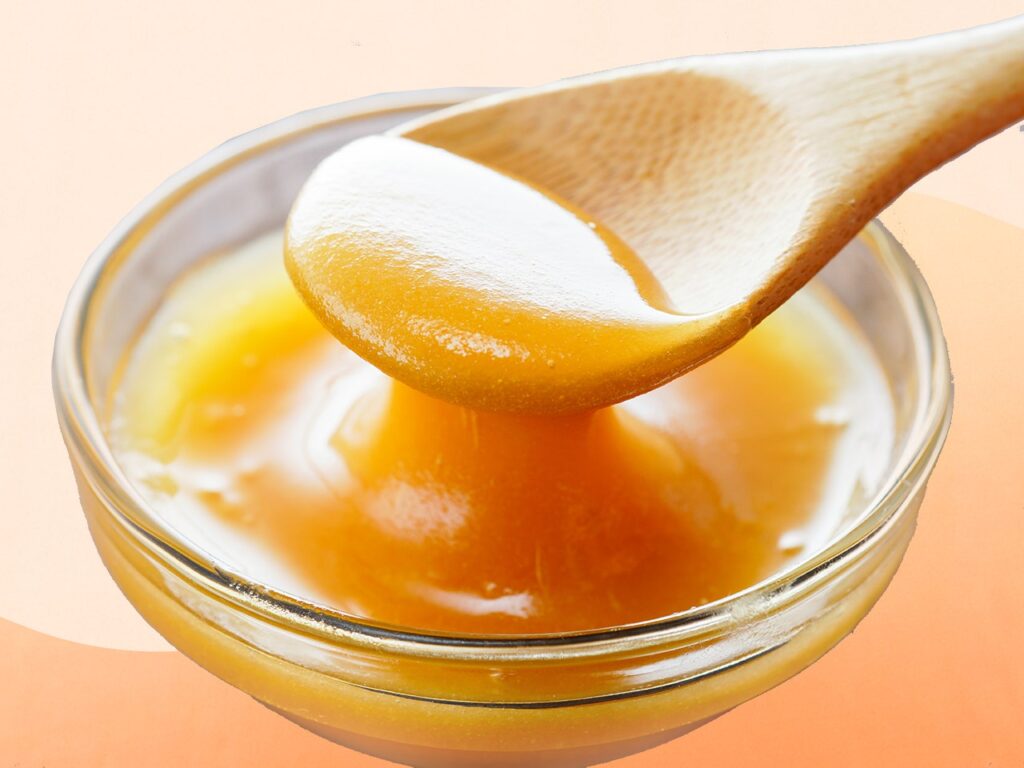
Different forms of manuka honey and their shelf life
Raw manuka honey
Raw manuka honey refers to honey that is minimally processed and retains its natural enzymes, flavor, and nutritional properties. When stored properly, raw manuka honey has a long shelf life and can last for several years without significant quality degradation. However, it is still important to check for signs of spoilage before consumption.
Creamed manuka honey
Creamed manuka honey undergoes a controlled crystallization process to achieve a creamy, spreadable consistency. It typically has a shorter shelf life compared to raw honey and should be consumed within a year or two after purchase. Proper storage conditions are essential to maintain the quality of creamed manuka honey.
Manuka honey tablets
Manuka honey tablets are a convenient and portable form of manuka honey. They are often formulated with other ingredients and compressed into tablet form. The shelf life of manuka honey tablets can vary depending on the specific formulation and packaging. It is advisable to follow the manufacturer’s instructions and guidelines for storage and consumption.
Manuka honey lozenges
Manuka honey lozenges are a popular choice for throat soothing and cough relief. The shelf life of manuka honey lozenges can vary depending on the ingredients and formulation. It is recommended to check the packaging for expiration dates and store them in a cool, dry place to maximize freshness.
Effects of expired manuka honey
Loss of antibacterial properties
Expired manuka honey may experience a significant loss of its renowned antibacterial properties. The unique antibacterial activity of manuka honey is attributed to its high concentration of methylglyoxal (MGO). Over time, the MGO content in manuka honey can decrease, leading to a decrease in antibacterial effectiveness.
Change in taste and texture
As manuka honey ages and expires, there may be noticeable changes in its taste and texture. The honey may become overly sweet or acquire an off-putting taste. Additionally, the texture may become grainy or gritty, making it less pleasant to consume.
Possible health risks
Consuming expired manuka honey can potentially lead to health risks. The degradation and decomposition of honey over time may result in the growth of harmful bacteria or yeast. This can lead to foodborne illnesses and pose risks to individuals with compromised immune systems.
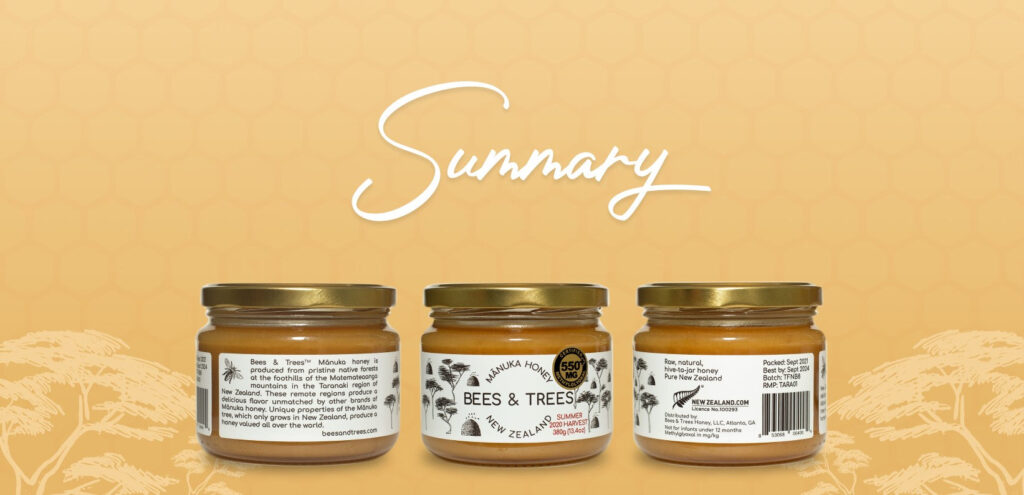
Prolonging the shelf life of manuka honey
Proper storage and handling
Proper storage and handling are crucial for prolonging the shelf life of manuka honey. Always ensure that the container is tightly sealed to prevent air and moisture from entering. Store the honey in a cool, dry, and dark place to minimize degradation. Handling the honey with clean utensils and avoiding contamination also helps maintain its freshness.
Avoiding heat exposure
Heat exposure can accelerate the degradation process of manuka honey. Avoid storing the honey in areas with excessive heat or near heat sources such as stoves or ovens. Heat can lead to crystallization, texture changes, and a decrease in quality.
Avoiding moisture
Moisture is detrimental to the shelf life of manuka honey. Moisture can trigger fermentation, leading to spoilage. Always ensure that the honey is stored in a dry environment and keep the container tightly sealed. Be cautious when using wet utensils or introducing water to the honey.
Using clean utensils
Using clean utensils when handling manuka honey is essential to prevent contamination and maintain its quality. Avoid using dirty or wet spoons that may introduce foreign substances into the honey. Clean utensils help preserve the integrity and longevity of manuka honey.
Using expired manuka honey for non-consumable purposes
Facial masks and treatments
Expired manuka honey can still be beneficial for non-consumable purposes, such as skincare. Manuka honey is known for its moisturizing and antibacterial properties, making it an excellent ingredient for DIY facial masks and treatments. Its natural antioxidants can help nourish the skin and promote a healthy complexion.
Wound healing
Manuka honey has long been recognized for its wound healing properties. While expired manuka honey may not be suitable for consumption, it can still be used topically on minor wounds, cuts, or burns. Its antibacterial properties can help prevent infection and promote the healing process.
Hair and scalp treatments
Expired manuka honey can be repurposed for hair and scalp treatments. Its moisturizing properties can help nourish and condition the hair, while its antibacterial properties may assist in addressing scalp issues such as dandruff. It is recommended to dilute the honey with water or other hair-friendly ingredients for better application.
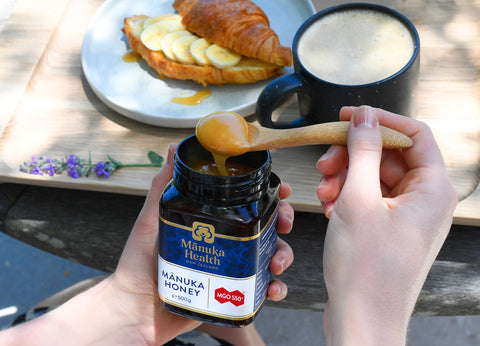
Tips for purchasing manuka honey with a longer shelf life
Choosing reputable brands
When purchasing manuka honey, opt for reputable brands that are known for their high-quality products. Established brands often have strict quality control measures in place, ensuring that the honey is sourced and handled properly, resulting in a longer shelf life.
Checking for UMF certification
UMF (Unique Manuka Factor) certification is a quality mark that guarantees the authenticity and potency of manuka honey. Look for UMF certified products as they undergo rigorous testing to ensure their quality. UMF certified manuka honey is likely to have a longer shelf life due to its higher quality.
Inspecting packaging
Inspecting the packaging is important when selecting manuka honey with a longer shelf life. Choose honey that is stored in airtight and durable containers. This helps protect the honey from contamination and external factors that can degrade its quality.
Determining production date
Knowing the production date of manuka honey can be useful in estimating its shelf life. Some manufacturers include the production date or batch number on the packaging. Fresher honey with a more recent production date is likely to have a longer shelf life compared to honey produced further in the past.
Conclusion
The shelf life of manuka honey can be influenced by several factors, including moisture content, temperature, exposure to light, quality of packaging, and storage conditions. It is important to be aware of the indicators of spoilt manuka honey, such as changes in appearance, texture, smell, and taste. Proper storage recommendations, such as sealing the container properly, storing in a cool and dry place, and avoiding direct sunlight, can help prolong the shelf life of manuka honey. Checking the expiration date, performing visual inspections, assessing aroma, and conducting taste tests can determine if manuka honey is still good to consume. Different forms of manuka honey have varying shelf lives, and expired honey may result in the loss of antibacterial properties, changes in taste and texture, and potential health risks. Prolonging the shelf life of manuka honey can be achieved through proper storage and handling, avoiding heat and moisture, and using clean utensils. Additionally, expired manuka honey can still be utilized for non-consumable purposes such as skincare, wound healing, and hair and scalp treatments. When purchasing manuka honey, consider choosing reputable brands, checking for UMF certification, inspecting the packaging, and determining the production date to ensure a longer shelf life. By following these guidelines, you can enjoy the benefits of manuka honey while ensuring its freshness and quality.
